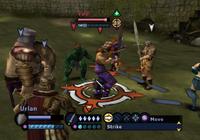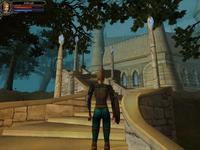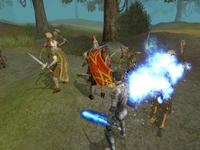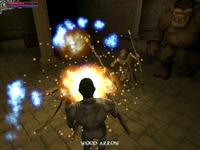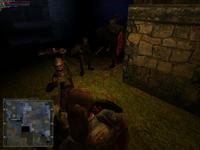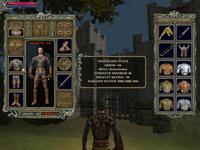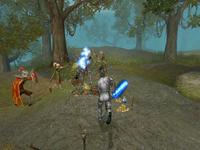|
|
|
Main News Forums Games Games Database Top 100 Release List Support Files Features Reviews Previews Interviews Editorials Diaries Misc Download Gallery Music Screenshots Videos Miscellaneous Staff Members Privacy Statement |
Dungeon Lords: A Conversation with D.W. Bradley
In cRPG history, three impressive series tower over the landscape: Ultima, Might & Magic and Wizardry. Behind some of these great games are famous names including Richard Garriott, Jon Van Caneghem -- and D.W. Bradley, whose mild-mannered and disembodied voice was on the ‘phone, punctuated by the static of the 10,000 miles that separated us. It was heading for 2am with only the coffee keeping me awake…that and the opportunity to participate in a telephone hook-up to discuss Bradley's latest project, Dungeon Lords. Heuristic Park's Dungeon Lords is positioned as a unique combination of 3rd-person epic roleplaying game with high-energy realtime action combat - in fact, it's promoted as a "combat RPG". Players will create and guide a single character through an original fantasy world, with two interwoven main story lines of love, treachery and betrayal. "RPGs are all about pulling players into different worlds", said Bradley. "They're fantasy simulations…but I like to design RPGs that are visceral, direct, in your face". Bradley explained that his goal is to create a game with the depth that roleplayers are looking for along with exciting combat, while still being easy for the average gamer to get into. We started by talking about the gameworld. Dungeon Lords is set in a world of classic high-fantasy with terrain from wilderness forests to arctic lands and the accompanying medieval kingdoms and denizens. One of the most attractive features is a large gameworld that is open for the player to freely explore, for the most part. After the starting town, players can choose to head off and explore as they fit, possibly stumbling across dangerous areas that are deadly for the player's current level, although Bradley says "there's probably a logical way to progress". The world is large, although the aim was not to make it so large that players might get unnecessarily lost or bored trudging across it. "From one end to the other…it might take an hour to walk across", Bradley explained. Once the character has learned how to use them, Moonbridges can expedite travel. You would expect dungeons to play a major role with this title and although Bradley only mentioned them in passing, I think you can expect some epic dungeon crawling. Dungeon Lords may mark the return of classic dungeon levels replete with puzzles and lots of hidden rooms. "Some dungeons may have 30-50 hidden chests…and you may only find 15. Some of them are diabolical". Don't worry too much, though. Bradley was clear he dislikes games that don't play fair: instant-death traps and the like just aren't fun. "I want to design from the perspective of what I'd like as a player, not as some cool designer". Naturally, players will encounter a wide range of NPCs in their travels. There are around 100 detailed quest and merchant NPCs to interact with through traditional dialogue trees. Although there are no specific dialogue skills or stat checks for dialogue ("we don't want to deny players the opportunity to play the game as they want to"), Bradley promises the NPCs will have individual personalities and motivations and many of them will react to different things with varying consequences: upsetting a trainer may make it hard to train in a particular skill, for example. Unlike some popular recent RPGs like Knights of the Old Republic and Fable, there is no specific good and evil track through Dungeon Lords. Bradley prefers a heroic protagonist, saying he felt the story would be "muddy" otherwise. However, the morality of the factions is quite complex with plenty of treachery and betrayal flowing through the two interwoven main story lines. Often the player will be unsure just who is an ally and who isn't. Dungeon Lords is undoubtedly an action game, with fast-paced combat playing a significant role. Dungeon Lords uses a full action model, with the player in direct control of the character's combat moves. Using the W, A, S, D directional keys along with the left-mouse will pull off a variety of moves, combos and spells in realtime; press left and the character will slash to the left, for example. Likewise, the direction keys and a right-click is used for various blocks and defensive moves. With the right timing, moves can be chained together to produce even more-impressive combos. Although combat is at the core of the game, Bradley pointed out they have tried to balance combat against other elements such as exploration, puzzle-solving and NPC-interaction. I asked Bradley to describe the character development system and he went on to describe it in some depth. Players create a character from around eight races (Bradley seems to be keeping the exact details under wraps), with six primary stats and skills in six categories. Characters start out with one class specialisation from Fighter, Mage, Adept or Rogue but a second specialisation can be acquired early in the game by joining one of the Guilds. This gets rapidly more complex: when the character reaches the appropriate level another class specialisation can be added with around a dozen choices such as Knight, Marauder and Valkyrie. All up, there are five class specialisation slots that can be used.
The various races and classes can access any of the available skills, although the proficiency and number of points needed for advancement will vary, with some skills requiring less skill points to advance with certain race or class combinations. Bradley pointed out that the type of character can be used as a balance against the player's own abilities, where a "beefier, physically hardy" character might help compensate for a player with lesser combat skills. An interesting feature is the different quests for particular character types. NPCs and Guilds will offer different side-quests, based on race, class or even sex. Next, the conversation turned to spellcasting. Dungeon Lords features four different spell types and each works in a different way. Each spell type is based on using some form of resource, which is always consumed, with no permanent spell memorisation or mana pool. Arcane magic is based on discovering spellbooks and scrolls and is elemental in nature. Characters can cast spells like Ice Storm and Fireball, with the spellbook or scroll consumed in the process. Nether magic pertains to demons and the undead and requires ingredients and reagents to cast spells like curses and summoning demons. Celestial magic (healing, light and so on) uses crystals, each of which has a specific spell and a number of charges. Finding more crystals of the same type adds to the charges. Finally, Rune magic (commonly called "fighter's magic") allows mana from different rune stones to be combined to create various spells of the buff and shielding variety. With the required materials, spells can be cast quickly and readily in combat. Importantly, some spells can be interrupted and the character can still block or defend while casting, with the right timing. Likewise, some spells like a magic missile can be dodged or blocked with a shield. I asked about the spellcasting interface and Bradley said it would be "similar" to the combat interface but the final layout had yet to be decided. "I'm experimenting with some different things…perhaps some form of selectable tablets of spells". One of Dungeon Lords' intriguing design decisions was to keep the main interface elements to an absolute minimum, with only a small health and experience bar on the playing screen. I asked Bradley about this design choice and whether players might feel they lacked valuable information. He responded that he didn't want excess interface elements distracting players from immersion in the gameworld. "It's all about what it's like to feel you are in a fantasy world", he said. "The game is built so player's don't need too much extra information". Still, a status bar that pops up at the bottom of the screen during combat has recently been added: "it's nice to know the name of the enemy you are facing". Other interface elements include inventory and quest screens that are easily accessible with hotkeys, fully user-configurable keys and unlimited saves. A key feature of Dungeons Lords is multiplayer support - and a coop mode in particular. Dungeon Lords can be played via LAN, direct Internet connection or through GameSpy, with up to 8 players at a time. A PvP mode of sorts exists but Bradley didn't elaborate and really stressed the coop - "it was designed for coop from the beginning". Multiplayer gamers will play through the same gameworld but with the combat difficulty scaled to the size of the group. Unlike many fantasy cRPGs, Bradley thinks parties will be more interesting than the classic fighter, mage, priest and thief paradigm, with more complex individual character builds, courtesy of Dungeon Lords' deep character system. With time running out, I asked two obvious questions: how will old Wizardry fans like Dungeon Lords and what is the development status? "Oh, they'll love it!", was Bradley's instant response. "It never feels arcadey or like you're hacking through endless dungeons. Every area feels unique and it always feels connected to the story backbone". As for the development status, Bradley wouldn't be drawn too much although the game is clearly in the final stages. "Testing, lots of testing…there's 33 different class specialisations for starters but you only use 5 in a game". Bradley is clearly passionate about this creation: "this is the RPG I've always wanted to make". We shouldn't have to wait too long to see the results and if Heuristic Park can successfully combine a large, open world to freely explore, detailed character progression, an entertaining story and fast-paced combat that's satisfying to pull off, he may add a new generation of players to his fanbase.
Links
Average Reader Ratings: 5.08 (52 votes) |
|||||||||||
|
All original content of this site is copyrighted by RPGWatch. Copying or reproducing of any part of this site is strictly prohibited. Taking anything from this site without authorisation will be considered stealing and we'll be forced to visit you and jump on your legs until you give it back. |
||




